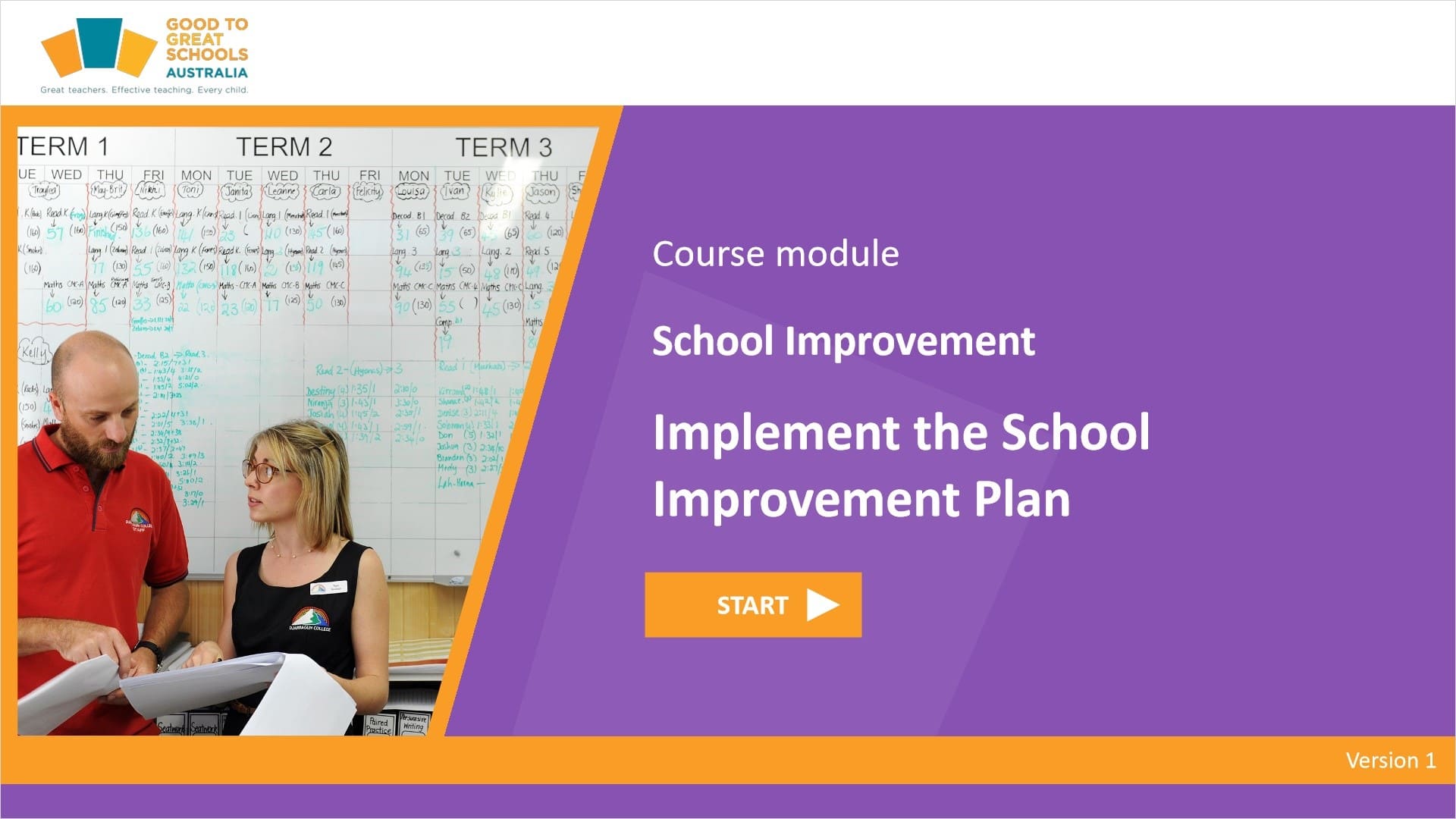School Improvement
Course Modules
Overview

Implement the School Improvement Plan
In this module, participants will understand how to implement School Improvement Plans using evidence-based practices and technologies.
Learning Intents
- Develop a whole-school instructional learning and behaviour plan that includes reflective practices, structured feedback and peer review (1.2.09).
- Develop a plan for improved outcomes based on student mastery and behaviour data (1.2.10).
- Implement school professional development plan using evidence-based practice and technologies (1.1.05).
- Evaluate effect of professional development on school improvement targets (1.1.05).
- Plan school improvement based on 8 Cycles of School Practice (1.1.06).
- Implement practices to enact, monitor and report school improvement strategies across the school and community (1.1.06).
- Review implementation of improvement plan with leaders and teaching team (1.1.06).
- Evaluate enactment, monitoring and reporting of improvement plan strategies (1.1.06).
- Implement practices that make up a results-focused instructional leader (1.1.07).
- Evaluate current practices around parent engagement and make improvement goals (1.1.08).
- Monitor progress of the whole-school professional learning plan and effect of professional development on school improvement targets (1.1.09).
- Articulate and document the effects of professional development on student mastery goals (1.1.09).
- Manage coaching and feedback cycles to provide school team with regular feedback (1.1.10).
- Monitor student mastery and observation data and identify ways to improve teaching and learning (1.1.10).
- Implement practices built on a vision of success for every student (1.2.05).
- Review student data with teaching team and leadership to ensure leaders and school team adhere to the vision of high expectations with no excuses (1.2.05).
- Review student mastery data and set improvement actions to increase mastery (1.2.06).
- Plan regular cycles of peer instruction practice (1.2.07).
- Evaluate the effect of peer instruction practices on student mastery and effective teaching practices (1.2.07).
- Implement cycles of parent engagement to support parents in increasing student learning outcomes (1.2.08).
- Evaluate ways parents are being engaged in supporting learning and apply to practices (1.2.08).
- Understand cycles of school practice that increase community engagement (1.3.04).
- Plan regular communication with leaders and teaching faculty focused on research of effective teaching (1.3.05).
- Implement school improvement efforts based on research on effective teaching (1.3.05).
- Plan school professional conversations based around collaborative and creative practices focused on school improvement (1.3.07).
- Plan practices that increase parent engagement to meet the diverse educational needs of students (1.4.06).
- Implement strategies that acknowledge and respect the cultural and linguistical diversity of families (1.4.06).
- Plan human resource management based primarily on instructional needs (1.5.05).
- Review how the school is applying resources to support students (1.5.08).
Prerequisite
- Learn Effective Teaching Essentials.
Duration
- 12 Lessons.
Assessment
Assessment has three stages:
- Test: Knowledge and skills taught in the lessons
- Appraisal: Practical application in practicing knowledge and skills learned in the lessons
- Mastery evaluation: Delivery with students of the knowledge and skills learned in the lessons.
Certification
Participants are eligible for certification based on attendance and completion of assessment requirements for each module.
- Certificate of Attendance: Complete online training and knowledge and skills tests.
- Certificate of Participation: Pass knowledge and skills video Appraisal.
- Certificate of Achievement: Pass knowledge and skills video Mastery evaluation.
